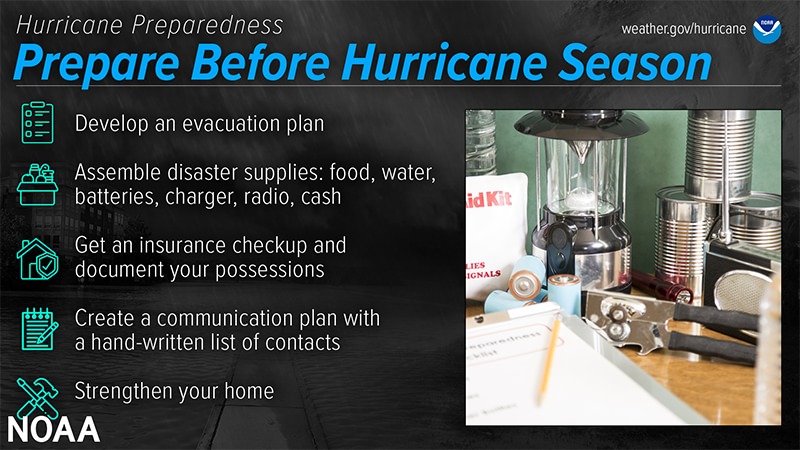National Hurricane Preparedness
Hurricane season begins on June 1, so if you live in a hurricane-prone area, it’s important to take steps to prepare. The National Oceanic and Atmospheric Administration (NOAA) offers the following tips on preparing for hurricane season:
1) Develop an Evacuation Plan
Having an evacuation plan is crucial during hurricane season. You do not need to travel hundreds of miles — your destination could be a friend’s or relative’s house who lives in a well-built home outside flood prone areas. Plan several routes and be sure to account for your pets.
2) Assemble Disaster Supplies: Food, Water, Batteries, Charger, Radio, and Cash
Whether you’re evacuating or sheltering-in-place, you’re going to need supplies — not just to get through the storm but for the potentially lengthy and unpleasant aftermath. Have enough non-perishable food, water, and medicine to last each person in your family a minimum of 3 days (store a longer than 3-day supply of water, if possible). Electricity and water could be out for weeks, so having extra cash, a battery-powered radio, and flashlights are necessary. You may need a portable crank or solar-powered USB charger for your cell phones. And lastly, don’t forget your pets!
3) Get an Insurance Checkup and Document Your Possessions
Call your insurance company or agent and ask for an insurance check-up to make sure you have enough insurance to repair or even replace your home and/or belongings. Home and renters’ insurance doesn’t cover flooding, so you’ll need a separate policy for it. Flood insurance is available through your company, agent, or the National Flood Insurance Program at floodsmart.gov. Act now, as flood insurance requires a 30-day waiting period.
Take the time before hurricane season begins to document your possessions: photos, serial numbers, or anything else that you may need to provide your insurance company when filing a claim.
4) Create a Communication Plan with a Hand-Written List of Contacts
Write down your hurricane plan and share it with your family. Determine family meeting places, and make sure to include an out-of-town location in case of evacuation. Write down on paper a list of emergency contacts, and make sure to include utilities and other critical services since the internet may not be accessible during or after a storm.
5) Strengthen Your Home
You can take steps to strengthen your home by trimming trees, and installing storm shutters, accordion shutters, and/or impact glass. It’s also recommended to seal outside wall openings. The garage door is the most vulnerable part of the home, so it must be able to withstand hurricane-force winds. If you’re a renter, work with your landlord now to prepare for a storm.
t’s also important to purchase the proper plywood, steel, or aluminum panels now to have on hand if you need to board up the windows and doors ahead of an approaching storm.
For more information on hurricane preparedness visit: https://www.noaa.gov/hurricane-prep
Credit: National Oceanic and Atmospheric Administration (NOAA)
Learn more about HazTek Safety & OSHA Training.
